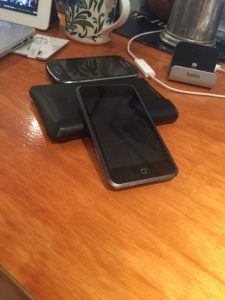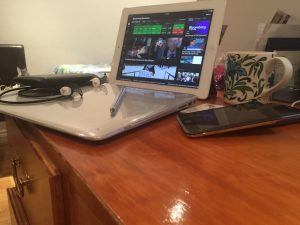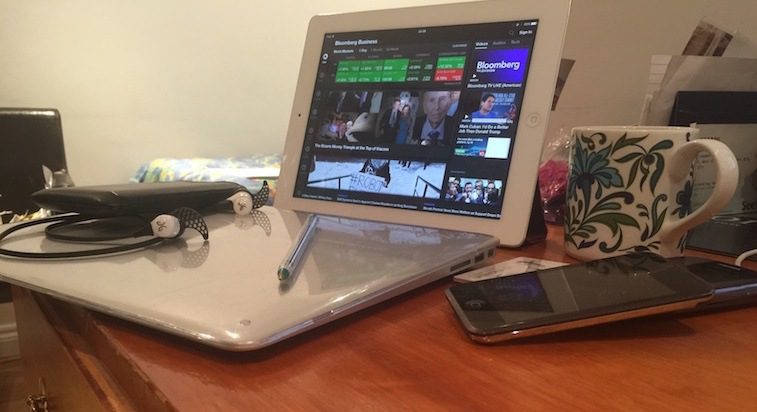If you are a teacher at university, you are wholly — and daily — aware of the challenge of battling for your students’ attention  beyond and behind the invading and invasive digital screens. In a school room, the tragedy of the situation is that the teaching is supposedly for the benefit of the participants. Yet, sometimes, it can feel like such an uphill battle. The teacher more than ever needs to “earn” the right to teach (i.e. gain the student’s attention). For students (and/or parents) paying top dollar for their university degree, one does marvel at how it has come to this, no?
beyond and behind the invading and invasive digital screens. In a school room, the tragedy of the situation is that the teaching is supposedly for the benefit of the participants. Yet, sometimes, it can feel like such an uphill battle. The teacher more than ever needs to “earn” the right to teach (i.e. gain the student’s attention). For students (and/or parents) paying top dollar for their university degree, one does marvel at how it has come to this, no?
The digital presence in the board room
In business meetings – especially those that are rather long and involve a larger number of executives – the question of attention can be just as problematic as the student listening and learning at university. Whereas the student is often paying for the class (and the lesson is nominally for him/her), the senior executives are in the room because their presence has been demanded/requested and they are being paid. And yet…
[tweetthis display_mode=”box”]Attention span in the board room can be as fleeting as in a classroom. #digitalhygiene[/tweetthis]
Digital hygiene in the board room
I have been in many senior management meetings where participants do any/all of the following:
- Keep the mobile phone(s) out on the table
- Keep the phone sounds on (so all incoming messages and notifications keep beeping, telephones and ipads keep ringing, etc…)
- Answer a phone call at the table (worse: make a call at the table…)
- Keep the iPad open on the table (and consult periodically)
- Keep the laptop open on the table (with notifications flashing in the top right)
- Read and write messages (surreptitiously under the table or directly out in the open…)
- Consult emails, Facebook, Bloomberg News, make travel reservations or worse…
- …

Since most of these senior executives have neither been educated (i.e. attended school) in the age of computers nor observed their children in university classes outrageously dissing the professor, they are mostly oblivious to the pernicious and noxious effects of these poor digital habits. The negative effects on attention are matched only by the disrespect of the people “on stage.” But, the pings and beeps and rings are also a distraction for those nearby as well. For meetings that involve at-a-distance participation (video conference calls and the like), it is highly likely that these beeps and vibrations on the table also impede the sound quality for those being dialled in. There is a general issue of digital hygiene and mobile etiquette and rules of engagement ought to be set out.
Rules of Engagement
Here are the four core rules that I would suggest (upfront) to run a Board or senior management meeting effectively:
- Smartphones must not be left on the table. If that is too much to ask, the strict minimum is that they be face down.
- [tweetthis]Smartphones must be, at least, on vibrate, or preferably on silent mode.[/tweetthis] No beeping or buzzing notifications can be tolerated. N.B. Even in handbags or pockets, the vibrating phone is a distraction.*
- If a laptop or iPad is kept on the table, the purpose must be directly related to the matters at hand (i.e. for presenting, note-taking…). Otherwise, it should be stored. Likewise, ipads and laptops need to have the notifications off/muted.
- If a specific call or message is urgently expected – and cannot otherwise wait – it must be explicitly signaled ahead of time.
Qualifying remarks
Of course, there are a couple of qualifying comments all the same:
- The leader(s) must set the example.
- Appropriate pauses must be organized (for cigarette breaks/natural breaks and to deal with urgent business matters).
- Consequences for transgression should be set up. My suggestion: 5€ in a kitty in the middle to be applied to a charity of choice?
Technical specifications
By way of other things that a modern meeting room should have as well:
- Enough plugs to allow everyone to recharge
- Good wifi to allow everyone to avoid roaming charges (during the breaks!).
There are presumably many people who might disagree or feel uncomfortable with these types of rules. The truth is that many people are letting themselves into these bad habits without truly recognizing the noxious elements.
Your thoughts and reactions please! Let me know if you agree/disagree and please add in other suggestions should you have some!
*The Apple Watch (or other smart watches) has all its worth in these situations, since the haptic is imperceptible to all others but the wearer.












Great tips for the better meetings. Thank you very much for sharing, I found it very useful. From my view, carrying a phone, laptop and etc is not a problem but attendees should use those whenever required. It’s better to inform all the attendees not to carry the phone and laptop before the starting of a meeting. But some cases phone and laptop are necessary like in our office, we are using the multitouch meeting management technology called meeting wall. Whatever we explain on that technology will be reflected on the attendees’ phone or laptop. And this technology helped us improve the productivity by 72% in 7 months.